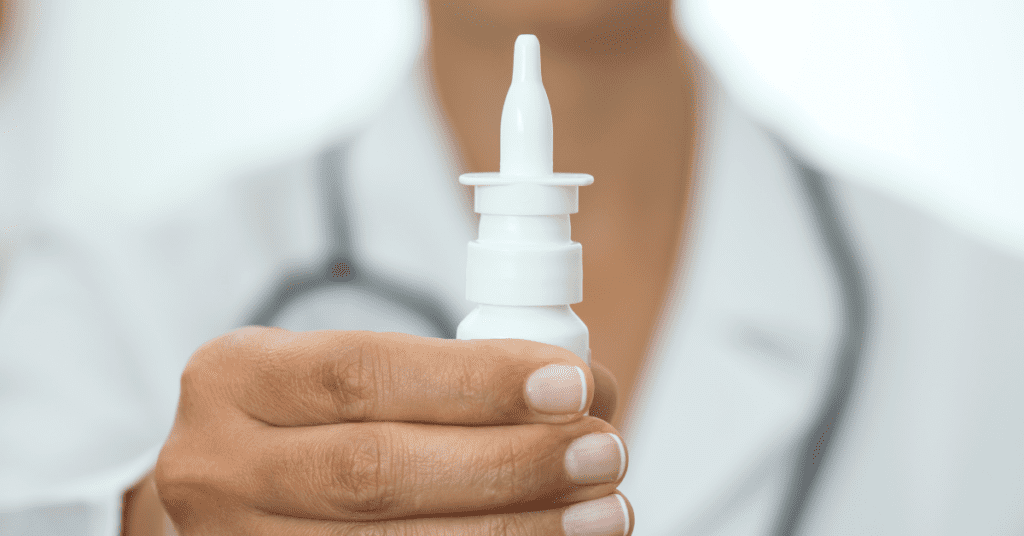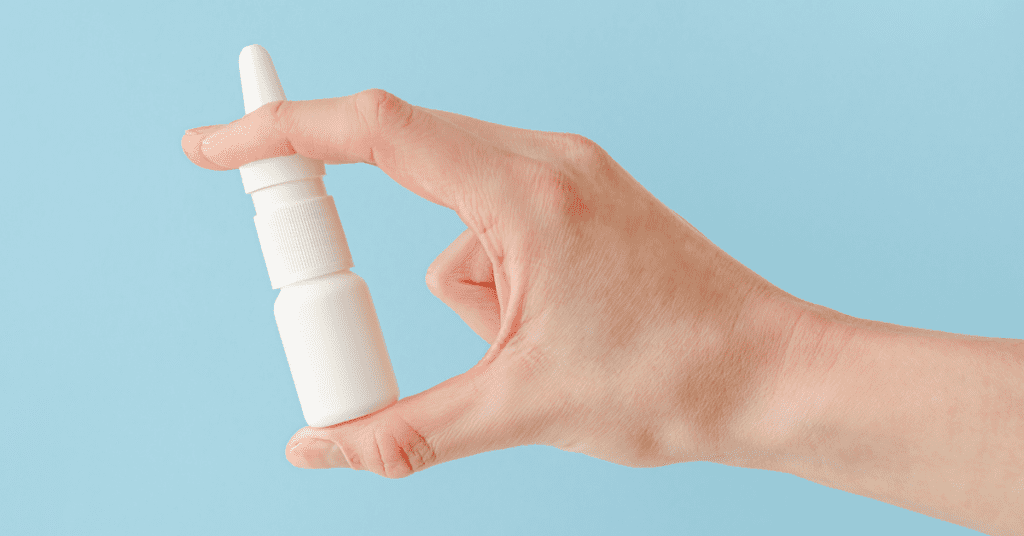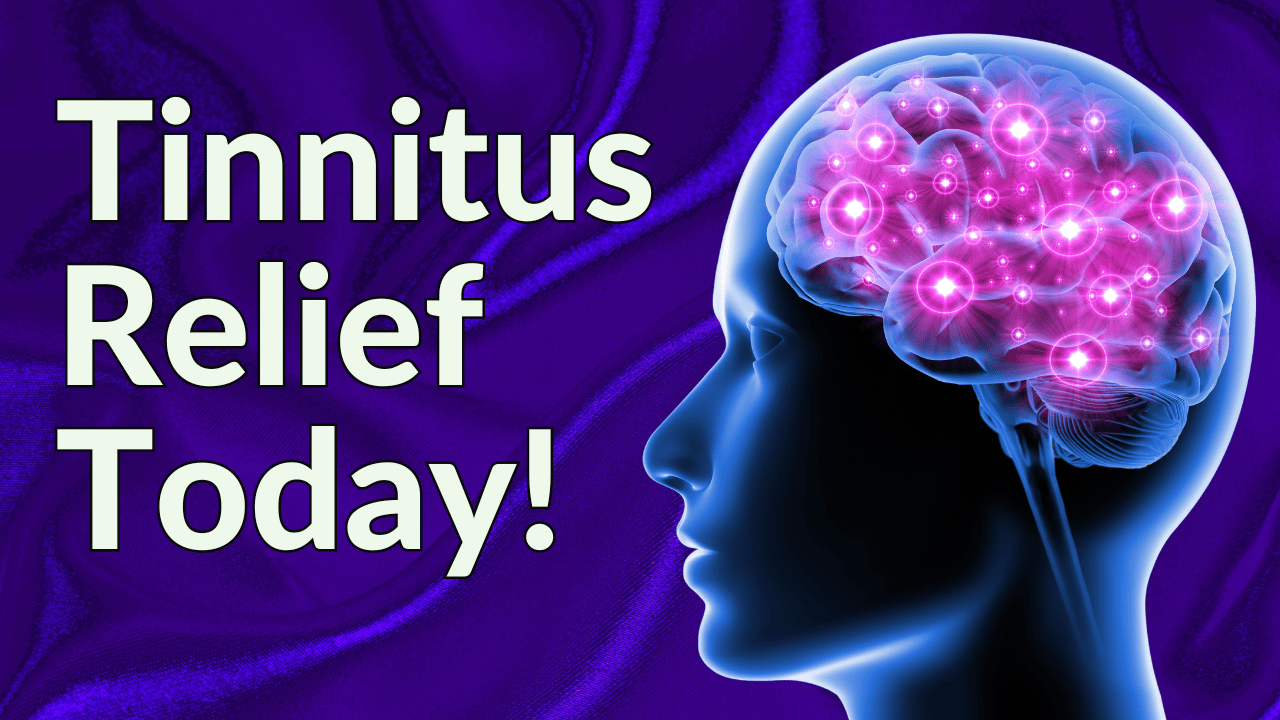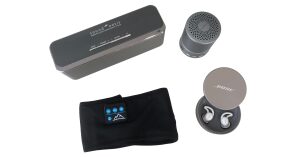Flonase is a commonly used over the counter nasal spray. It is used to help those who are struggling with ear pain, ear fullness, sinus congestion and more as a result of mucus build up caused by seasonal allergies. Although Flonase may not typically come to mind when thinking about medications you might use to treat ear problems, there is a connection between the ear and the nose via the sinus cavities. The sinus cavities are connected to the nasal passages and ears via the Eustachian Tube. When the Eustachian Tube is not working appropriately, it is referred to as Eustachian Tube Dysfunction and Flonase is sometimes used to manage this. Therefore, the use of Flonase may affect how the ear functions in relation to the sinuses. We will take a closer look at how the ear and sinuses are connected and whether a disruption to these systems might impact tinnitus, as well as whether the use of nasal sprays like Flonase may help to alleviate tinnitus symptoms or make tinnitus symptoms worse.
What Is Flonase?
The nasal spray Fluticasone is a type of nasal steroid that helps to reduce inflammation, often used to provide relief from allergy symptoms such as sneezing, itchy nose, and runny nose. These symptoms may be related to seasonal issues such as pollen allergies or other sinus issues. Fluticasone nasal spray may also be referred to as the following brand names: Flonase (common), Flonase Allergy Relief, Flonase Sensimist, ClariSpray, Veramyst, XHANCE. Sold in caplets and sprays, Flonase is not a drug designed to be sprayed into the ear canal, but some have suggested it may be able to impact hearing and the ear drum, or it may mask symptoms of an ear infection that goes undiagnosed and untreated, thereby triggering the onset of a tinnitus sound like buzzing or ringing. Flonase is meant to be entered into your body through the nostrils, not through the ear canal. Instructions from the manufacturer specify the specific dosage for both adults and children.
"Treble Health helped me reduce my tinnitus by about 80%, and now I can live my life again!"


"Treble Health helped me reduce my tinnitus by about 80%, and now I can live my life again!"
– Steve D.
Book a free consultation to learn which Treble Health solution is right for you. Join Steve and thousands more who have found lasting tinnitus relief.
While there was some initial question about whether or not Flonase had ototoxic properties when used to treat congestion, it has been found that those who take Flonase are not at an increased risk for hearing damage or tinnitus. Whether you began taking the spray prior to a tinnitus diagnosis or after, rest assured that damaged hearing is not currently considered a common side effect of Flonase and other sinus sprays.
Why Would A Doctor Recommend Nasal Spray For Ear Problems?
Nasal sprays are a common treatment when a person reports symptoms consistent with eustachian tube dysfunction. Our Eustachian tubes serve to connect the back of our noses with our middle ear spaces. The middle ear space should always be full of fresh air that is equalized in pressure each time we swallow, yawn, or even chew. This equalization of fresh-air allows for optimal sound transmission through the middle ear for best hearing ability and allows us to remain comfortable when changing elevation. If you’ve ever felt your ears “pop” while ascending or descending in an airplane, this sensation is normal and it was likely your Eustachian Tubes at work! The Eustachian tubes can also allow any fluid build up to drain out of the middle ear that has built up where it shouldn’t be!



There are times when a person’s eustachian tube (or both tubes) may not work as expected. There are times when the tube may remain open – this is referred to as a “patulous eustachian tube.” Tubes may become blocked, which would prevent them from opening appropriately to clear fluid and regulate pressure. This is called “eustachian tube dysfunction.” A person may experience ear pressure, pain, a “popping” sensation, or tinnitus (often described as ringing) in their ears. These symptoms can range from mild to severe. Some people are able to temporarily feel relief from these symptoms by doing the Valsalva Maneuver, a procedure that forces air into the sinuses and eustachian tubes. Taking Flonase or other nasal sprays can help to alleviate swelling in the surrounding nasal/sinus tissues allowing space for the Eustachian Tube to function properly. Flonase and other nasal sprays should be used according to their instructions and you should always consult with a physician before using them.
Using Flonase in a way incongruent with manufacturer instructions, such as spraying into the ear canal, is highly unlikely to lead to any life threatening consequences, as the spray is designed to improve blood flow to the sinus area and ease symptoms associated with both acute sinusitis and allergies. Nevertheless, the spray will not target the underlying cause of the hearing loss, or the sounds associated with tinnitus, and will not permeate the eardrum itself. Before using Flonase as a form of tinnitus intervention or a way to target discomfort in the ears, consider speaking with your medical professional about when symptoms of tinnitus started and how they might be impacted by congestion, illness, or infection targeted by Flonase.
What Is Tinnitus?
Tinnitus is a hearing condition characterized by phantom sounds, such as ringing, buzzing, or rushing. The causes of tinnitus are varied and range from one person to another. Exposure to loud noises is considered a common culprit, and head and neck injuries leading to sensorineural hearing loss have also been pinpointed as possible instigators. Ear infections, chronic allergies leading to sinus congestion, eustachian dysfunction, and more can cause people to hear ringing, rushing, or buzzing. Other conditions and experiences have been thought of as possible causes of tinnitus. Anxiety, depression, and other mental health conditions may put you at increased risk to hear phantom sounds, as can chronic pressure in the sinuses and congenital conditions.
Does Flonase Cause Tinnitus?



Flonase does have some known side effects. The Mayo Clinic indicates that common side effects include bloody nose, chest tightness, cough, fever, headache, muscle aches, pain or tenderness around the eyes and cheekbones, sore throat, stuffy or runny nose, trouble breathing, and unusual tiredness or weakness. Fortunately tinnitus is not on the list of common side effects for Flonase, so although it’s not impossible, it would not be an expected side effect.
While Flonase is not a medication that is considered to cause tinnitus and is not known to make tinnitus worse, people suffering from nasal congestion and other issues with the eustachian tubes, ear damage, or fluid build up may not want to immediately reach for the spray. In normal amounts, Flonase is not known to cause severe issues, but consistently using a spray to target bad allergies may not get to the root of the issue, and there may be more effective interventions to target sinus symptoms and allergies.
Can A Nasal Spray Help Tinnitus?
Nasal sprays are designed to help with issues regarding the sinuses, which we know now can include part of the ear, specifically the Eustachian Tubes. Nasal spray can help with mild tinnitus symptoms when related to sinus congestion, because these sprays are used to ease congestion in the sinuses, thereby alleviating pressure and inflammation on surrounding tissues, including the Eustachian Tubes. Abnormal fluid build up present in the middle ear cavity as a result of Eustachian Tube Dysfunction caused by sinus infections and other sinus-based illnesses can lead to symptoms of tinnitus as well. Though these interventions are not considered front-line treatments to cure these issues, and are typically intended for short-term use, the use of nasal sprays may be helpful in those who suffer with both chronic sinus congestion and tinnitus.
Do Some Nasal Sprays Make Tinnitus Worse?
At present, there is little to no evidence that sprays make tinnitus worse. Although the exact mechanics of and reasons behind the development of tinnitus remain in question and a source of research, sprays for the nose are not currently linked to higher frequencies of tinnitus diagnosis. A doctor may even recommend that a patient use Flonase to soothe allergies and ease sinus pressure, thereby lessening pressure in the ears and possibly improving tinnitus short-term.
Links Between Sinus Symptoms And Tinnitus
Tinnitus is a condition that can involve issues of the outer, middle, and/or inner ear and there are many instigators of the condition. Because parts of the ear and sinus cavities are linked, illness and injury in one area can affect the other. Other causes of tinnitus are not uncommon, but basic sinus infections, ear infections, and similar illnesses can all be linked to ringing in the ear. Drugs to target these issues are common and useful, and may act as something of a preventive measure, but they can also help relieve some of the pressure that leads to phantom sound, and ease pressure in the head enough to lessen anxiety and discomfort and improve tinnitus patients’ ability to hear.
Standard Tinnitus Treatment
Tinnitus is often addressed with a combination of treatments, including sound therapy, hearing aids, cognitive behavioral therapy (CBT), and tinnitus retraining therapy (TRT). By using a multi-pronged approach, many patients are able to experience relief from symptoms, or relief from the negative reactions many people have in response to the onset of tinnitus.
Additional changes, such as limiting noise exposure, can help ease some of the damage sustained by the tiny bones of the ear and small hair cells found in the inner ear, both of which are linked to tinnitus symptoms. From preventative actions and interventions to a more reactive approach, standard treatment options are typically delivered in partnership with an ENT specialist or audiologist, in order to ensure that all bases are covered and the most likely root causes of tinnitus are successfully being addressed.
At present, there is no definitive cure for tinnitus. Injuries to the head and neck can be addressed to limit tinnitus symptoms, and drugs can be either added or removed (in the case of ototoxic drugs) to help ease the signs of the condition. Pressure in the sinuses can be treated using Flonase or another spray designed to relieve pressure in the sinuses, and drugs targeting ear infections can help treat any infection-based causes. When all areas relating to the condition are addressed, tinnitus treatment is most effective.
Conclusion
The nasal passages and the ear are all closely connected and it is amazing that something that affects one might have a significant impact on the other. If you are suffering with tinnitus and sinus congestion or you have tinnitus and notice an increase in your tinnitus symptoms during allergy season it may be time to talk to your doctor about a nasal spray like Flonase. It is important to seek medical advice when starting any new medication to ensure that your sinus symptoms are appropriate to treat with a nasal spray such as Flonase.
Although a hearing aid and various forms of therapy, such as Tinnitus Retraining Therapy are considered the frontline treatments for tinnitus symptoms, a nasal spray can also prove itself to be a useful aid as part of a multi-pronged treatment approach when tinnitus symptoms have grown worse as a result of nasal pressure or congestion caused by illness or allergies.
Treble Health Can Help You Reduce Your Tinnitus
At Treble Health, we specialize in treating tinnitus – regardless of the cause. Our team of audiologists is proficient in addressing the unique challenges that tinnitus presents. If you have any questions about your tinnitus, or are just looking to learn more about treatment options, we encourage you to schedule a complimentary telehealth consultation with an audiologist on our team. During this 20-minute Zoom session, our experienced audiologists will listen to your story, answer any questions you may have, and provide personalized recommendations to alleviate your tinnitus symptoms. Don’t let tinnitus control your life any longer; click here to book your free consultation and start your journey to better auditory health.
Next Step: Book Free Consultation
- 75% of patients reduced their tinnitus within three months after following our recommendations.
- "I feel like Treble Health literally gave me my life back." - Randy S. (verified customer)
- Join thousands of people who have reduced their tinnitus after scheduling a free consultation.




















